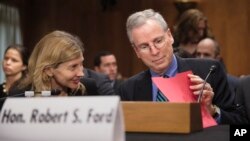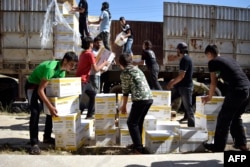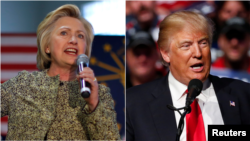Within the Obama administration, disagreement over Syria policy is nearly as old as the five-year-old conflict itself.
While some senior State Department officials have long favored more aggressive action against the Bashar al-Assad government, the White House has resisted those calls out of fear of pushing the U.S. into another war. Instead, it has focused on a military campaign against the Islamic State group.
But an internal diplomatic cable criticizing the administration’s policy that was signed by more than 50 State Department diplomats has brought the discussion to the fore.
A draft of the cable, disclosed to The New York Times and The Wall Street Journal, asked the Obama administration to employ a "judicious use of standoff and air weapons" to engage the Syrian army in a bid to hasten an end to the civil war. (A standoff weapon is one launched from a distance sufficient to let attacking personnel evade defensive fire from the targeted area.)
"The moral rationale for taking steps to end the deaths and suffering in Syria, after five years of brutal war, is evident and unquestionable,'' it read. "The status quo in Syria will continue to present increasingly dire, if not disastrous, humanitarian, diplomatic and terrorism-related challenges.''
A critical mass
One reason the cable rocked Washington was the high number of signatories.
“Fifty-one loyal and effective officials have risked their careers to protest a policy that is profoundly wrong and fully counterproductive,” said Atlantic Council analyst Fred Hof.
The former U.S. ambassador to Syria said it was highly unusual, if not unprecedented, for more than 50 State Department diplomats to sign an internal diplomatic cable critical of presidential policy.
“In my experience dating back to 1985 in the Department of State,” Robert Ford said, “I have never heard of a Dissent Channel message that had 10 signatures, much less one that had 50.”
He said the high number of signatures indicated that the officials responsible for implementing policy on the ground in Syria, pushing for a negotiated political solution and dealing with the refugee crisis, didn't think they could meet the objectives under the current policy.
"They are warning that the way that it is going now, it is never going to succeed and there needs to be, therefore, a change,” said Ford, who is now a Middle East Institute analyst.
Dramatic changes unlikely
But Ford added that President Barack Obama was unlikely to make dramatic changes to his Syria policy so late in his administration.
Obama “sets Syria policy,” said Michael O'Hanlon, a senior fellow at the Brookings Institution, a Washington public policy research group. If the president wasn’t persuaded by criticisms voiced by former Secretary of Defense Leon Panetta and other senior officials, “I don’t think what 51 diplomats say will do the trick," O'Hanlon said.
The White House’s opposition to armed intervention in the Syrian conflict stems from U.S. experience in Afghanistan, Iraq and Libya, said Steven Hydemann, the Janet Wright Ketcham chair of Middle Eastern studies at Smith College in Northampton, Massachusetts.
“It sees Syria through the lens of those earlier experiences,” Hydemann said of the Obama administration.
“No one is content with the status quo,” State Department spokesman John Kirby said in a Friday briefing.
He added that as the administration looked at other options, “none of those other options are better than the one that we are pursuing.”
Effect on campaigns
Even if the memo does not sway the Obama administration into taking greater military action in Syria, it may have an impact on the 2016 presidential campaign.
Presumptive Republican nominee Donald Trump could use it as ammunition to criticize the administration’s Syria policy, while Hillary Clinton, the presumptive Democratic nominee, is likely to use it in support of her call for a more vigorous approach toward the Syrian conflict.Clinton has called for creation of a no-fly zone over rebel-held areas in Syria and a more forceful delivery of humanitarian assistance, among other measures.
“I think it matters a great deal in the upcoming electoral debate,” Brookings' O’Hanlon said. “By critiquing the administration’s Syria policy, they’ve invigorated the debate and added a neutral voice to the debate.”






